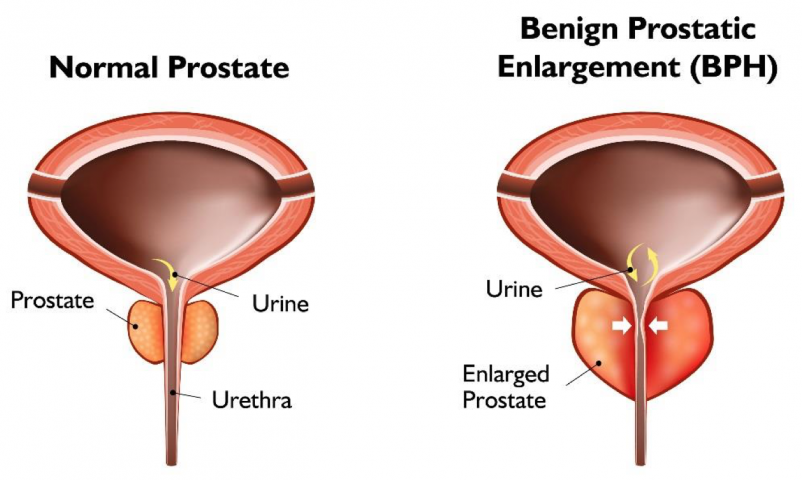108 Glen Osmond Road, Parkside

Benign prostatic hyperplasia (BPH), is a common urological condition caused by the non-cancerous enlargement of the prostate gland in aging men. The prostate is part of the male reproductive system, is about the same size and shape as a walnut and weighs about an ounce. It is located below the bladder and in front of the rectum, and surrounds the urethra, the tube-like structure that carries urine from the bladder out through the penis. The main function of the prostate is to produce ejaculatory fluid.
Since the prostate surrounds the urethra just below the bladder, its enlargement can result in symptoms that irritate or obstruct the bladder. A common symptom is the need to frequently empty the bladder, sometimes as often as every one to two hours, especially at night. Other symptoms include the sensation that the bladder is not empty, even after a man is done urinating, or that a man cannot postpone urination once the urge to urinate arises. BPH can cause a weak urinary stream, dribbling of urine, or the need to stop and start urinating several times when the bladder is emptied. BPH can cause trouble in starting to urinate, often requiring a man to push or strain in order to urinate. In extreme cases, a man might not be able to urinate at all, which is an emergency that requires prompt attention.
Treatment Options in Allopathy :
Several reviews exist on the current treatment approaches to BPH . What follows is a general overview and not a comprehensive review.
1. Surgery - Various forms of surgery are available to remove portions of the prostate. These tend to treat the enlargement with good success but have unpleasant side effects such as decreased sexual function (impotence, pain, ejaculatory dysfunction) and bladder incontinence. Newer procedures such as trans-urethral resections or incisions can be done to remove portions of the prostate. These procedures work well for removing portions of the prostate, but do little to address the process that caused the enlargement to begin with. Complications of scar tissue and infections are not uncommon in these procedures.
2. Drugs - Two types of drugs are primarily used, 5- a-reductase inhibitors and alpha andrenoceptor blockers (alphablockers). Finasteride (Proscar) is the most used 5- a-reductase inhibitor. It blocks the conversion of testosterone to DHT. Finasteride often requires 6 months to a full year before significant results are evident. Alpha-blockers such as terazosin, prazosin and others act by relaxing the muscles around the prostate, relieving many of the symptoms of BPH. While having a more immediate effect on symptoms, it does not change the underlying problems associated with the enlarged prostate.
Ayurvedic View and Treatment options :
In Ayurevda, prostate enlargement is named as parush granthi shoth. Ayurveda describes two conditions known as mootrakruchra and mootraaghaata, which coincide with the symptoms of prostatism or Parush granthi shoth. Mootrakruchra or strangury is characterized by severe pain in passing urine whereas in mootraaghaata, there is total suppression or intermittent flow of urine during urination.
Causes and types according to Ayurveda :
This problem is associated with urine elimination which is the function of apan vayu. Apan vayu’s role is to control the movements of lower region of your back, pelvic region, urine excretion and ejaculation.Prosate enlargement is due to imbalance of vata doshas due to the consumption of foods which result in aggravation of vata dosha.There is One more similar disease named as mootrakruchha which has various types in ayurveda.
Vataj mootrakruchha is caused by imbalanced vita dosha and results in difficulty in urination and intense pain in pelvic region. Prosate enlargement is comparable to Vataj mootrakruchhra.
Pittaj mootrakruchhra is the result of imbalanced pitta dosha and causes frequent, burning sensation along reddish and yellowish urine.
Kaphaj mootrakruchhra is due to imbalanced kapha dosha which causes the turbid urine.
Sannipatik mootrakruchhra is due to imbalance of all three doshas – vata, pitta and kapha.
Treatment in Ayurveda :
Ayurvedic herbal formulations for enlarged prostate gland handle inflammation, enlargement and congestion efficiently. Ayurvedic herbs for enlarged prostate are capable of shrinking over-grown gland back to normal size due to old age. These minimize chances of surgeries and relieve symptoms like restricted urine flow, semen with urine, pain and burning during urination. Ayurvedic herbs for enlarged prostate increase semen volume, promote ejaculation with force, and increase male’s libido by prolonging duration of his climaxes. These reverse ill-effects of malpractices like hand-practice and excessive coition and prevent build-up of fluids around gland to maintain its functions. Ayurvedic herbs for enlarged prostate gland protect gland from damages caused by free-radicals and immune system malfunctions like auto-immune disorder.
Disclaimer : Sandeep Kumar and Anupam Vasudeva are not GP, they have Ayurveda medical degree from India where it is considered equal to any other medical degree. This qualification is recognized in Australia by vetassess governing body as Complementary Health Therapists. Life Line Ayurvedic Herbal Clinic does not claim to cure a disease or terminal illness and does not create any unreasonable expectation of beneficial treatment. Ayurvedic medicines and treatments are generally considered to be safe but rarely may be associated with possible adverse reactions in individual cases. We recommend seeking urgent medical attention in the case of an adverse reaction. This website provides you with information. You must contact your Ayurvedic or another health professional before you apply them. Read More